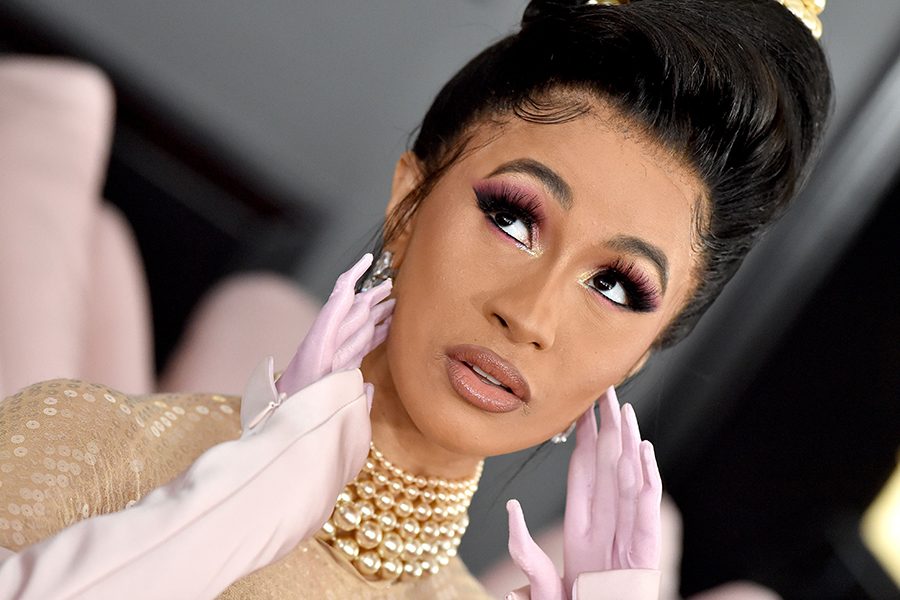
Cardi B is no stranger to legal troubles, however, the latest lawsuit naming the rapper might be the strangest yet. So strange that it could alter how content creators approach depicting tattoos in media moving forward.
For over a year, the “WAP” rapper has been facing a lawsuit from the model Kevin Brophy Jr. over the appearance of his back tattoo on the cover of her 2016 debut mixtape Gangsta Bitch Music Vol. 1, The Hollywood Reporter details. Now Cardi B is set to face a jury in what appears to become a landmark case for tattoo copyright liability.
Brophy claims Cardi misappropriated his likeness in “a misleading, offensive, humiliating and provocatively sexual way” in order to launch her career. And at this point, there’s no dispute whose tattoo appeared on Gangsta Bitch Music Vol. 1. Brophy’s distinctive back tattoo of a tiger fighting a snake is clearly depicted on the back of a male model pictured on Cardi’s mixtape cover performing cunnilingus on her.
Cardi B’s legal team insists the Kevin Brophy Jr’s lawsuit against the rapper is out of the question, as the mixtape earned less than $1 million. Brophy’s response suggests he doesn’t want anyone thinking he would ever eat out Cardi…https://t.co/D0lGB59rki
— Inked (@Inkedmag) August 31, 2019
Due to the overtly sexual context of the image, Brophy’s lawsuit includes a false light claim, which is a cross between privacy invasion and defamation. Cardi’s initial rebuttal was that the reappropriated tattoo was covered by transformative fair use, which is when an artwork is significantly revised so it’s no longer just an imitation. However, a judge has since rejected this argument.
The judge pointed to a testimony from Timm Gooden who created the mixtape cover. Gooden got $50 to make a quick design and was told to find a tattoo off the internet to cover the back of the male model. Gooden admitted he googled “back tattoos,” found an image, and pasted it onto the cover.
Brophy is seeking over $1.5 million in damages. Now a jury will have to decide the merits of the case.
Cardi B’s prospective trial could decidedly advance case law about tattoo copyright, exploring the legal repercussions of tattoo depiction in media and to whom the copyright should be affixed (the tattoo artist or the wearer). The Gangsta Bitch Music Vol. 1 case is the first of its kind in the music business (as far as we know), with cases like this one usually involving sports video games. Notably, an action by a tattoo artist brought against the WWE for copying a wrestler’s tattoo for video games is also pending. Cardi B’s trial could determine just how such cases will be decided in future.
Source: highsnobiety.com

Cardi B is no stranger to legal troubles, however, the latest lawsuit naming the rapper might be the strangest yet. So strange that it could alter how content creators approach depicting tattoos in media moving forward.
For over a year, the “WAP” rapper has been facing a lawsuit from the model Kevin Brophy Jr. over the appearance of his back tattoo on the cover of her 2016 debut mixtape Gangsta Bitch Music Vol. 1, The Hollywood Reporter details. Now Cardi B is set to face a jury in what appears to become a landmark case for tattoo copyright liability.
Brophy claims Cardi misappropriated his likeness in “a misleading, offensive, humiliating and provocatively sexual way” in order to launch her career. And at this point, there’s no dispute whose tattoo appeared on Gangsta Bitch Music Vol. 1. Brophy’s distinctive back tattoo of a tiger fighting a snake is clearly depicted on the back of a male model pictured on Cardi’s mixtape cover performing cunnilingus on her.
Cardi B’s legal team insists the Kevin Brophy Jr’s lawsuit against the rapper is out of the question, as the mixtape earned less than $1 million. Brophy’s response suggests he doesn’t want anyone thinking he would ever eat out Cardi…https://t.co/D0lGB59rki
— Inked (@Inkedmag) August 31, 2019
Due to the overtly sexual context of the image, Brophy’s lawsuit includes a false light claim, which is a cross between privacy invasion and defamation. Cardi’s initial rebuttal was that the reappropriated tattoo was covered by transformative fair use, which is when an artwork is significantly revised so it’s no longer just an imitation. However, a judge has since rejected this argument.
The judge pointed to a testimony from Timm Gooden who created the mixtape cover. Gooden got $50 to make a quick design and was told to find a tattoo off the internet to cover the back of the male model. Gooden admitted he googled “back tattoos,” found an image, and pasted it onto the cover.
Brophy is seeking over $1.5 million in damages. Now a jury will have to decide the merits of the case.
Cardi B’s prospective trial could decidedly advance case law about tattoo copyright, exploring the legal repercussions of tattoo depiction in media and to whom the copyright should be affixed (the tattoo artist or the wearer). The Gangsta Bitch Music Vol. 1 case is the first of its kind in the music business (as far as we know), with cases like this one usually involving sports video games. Notably, an action by a tattoo artist brought against the WWE for copying a wrestler’s tattoo for video games is also pending. Cardi B’s trial could determine just how such cases will be decided in future.
Source: highsnobiety.com
